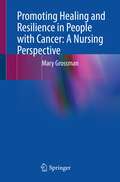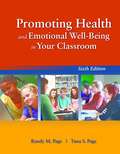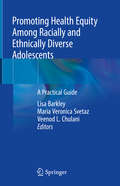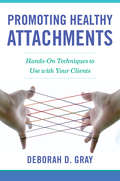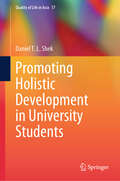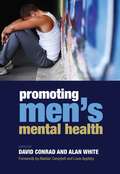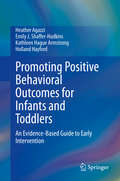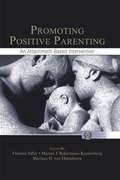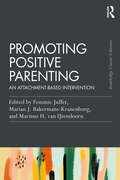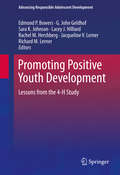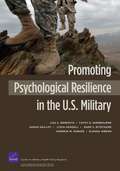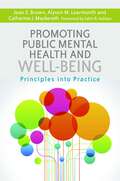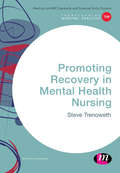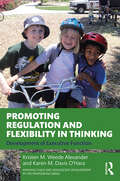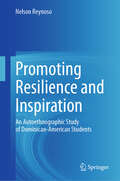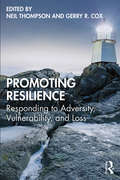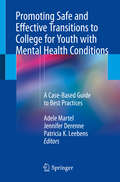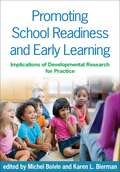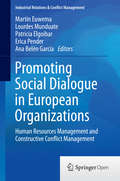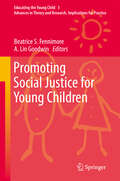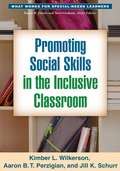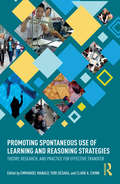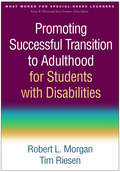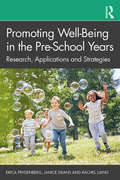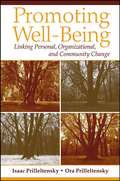- Table View
- List View
Promoting Healing and Resilience in People with Cancer: A Nursing Perspective
by Mary GrossmanThis is the first Nursing book on cancer care designed around a conceptual model of whole person care. Key concepts are stress, healing, resilience and health. As a clinical model, nursing goals, desired outcomes, key concepts and proposed psychosocial interventions with patients and family caregivers, advance the practice of clinical nursing toward a more comprehensive understanding of the whole person with cancer and their loved ones. As a model for teaching nursing students about chronic illness, it provides a scientific basis for students to learn how to assess and care for the whole person and his loved one. As a model for clinical research in the field of cancer care, it serves as a predicate for the development, evaluation and interpretation of clinical interventions. The model is a dynamic framework that both informs and is informed by research findings. It is hoped that future research findings will reveal the optimal combination of interventions to provide comprehensive care across clinical contexts. With a patient-centred humanistic focus anchored by the quality of the nurse patient and family caregiver relationships, it is hoped that the nurse's technical, procedural and medical expertise may complement rather than define the nurse's approach to the whole patient and family. The book is structured to facilitate the reader's easy access to needed information. Each chapter examines a key concept of the model, and is organized around an introduction, learning objectives, definitions, and relevant research findings that serve as the scientific predicate for suggested interventions discussed in Part 4, Nursing approaches. Clinical and personal anecdotes, tables and figures illustrate the concepts under discussion. Nurse practitioners, clinic nurse specialists, nursing professors, graduate students, and nurse researchers may find this book a useful reference for conceptualizing whole person care, and for determining relevant interventions that promote healing, resilience and health. But it is also relevant for family doctors and fourth year students learning to care for the whole person with a chronic illness.
Promoting Health And Emotional Well-Being In Your Classroom
by Randy Page Tana PageNewly redesigned with easy-to-hand in worksheets and activity sheets, the Sixth Edition of Promoting Health and Emotional Well-Being in Your Classroom provides pre-service and current teachers with all the tools and up-to-date information needed for effectively promoting healthy life choices in and out of the classroom. Framed around the latest National Health Education Standards and the Centers for Disease Control and Prevention's six risk behaviors, this practical text facilitates instructional planning, allows for easy adaptation into various curricular frameworks, and ensures that the most essential health education content is addressed. New and Key Features: - Newly redesigned with perforated pages allow students to easily turn in assignments and activities. - Includes more than 275 interactive assessments and learning activities, many of which are new or revised. Each risk behavior chapter includes activities for advocacy, family and community involvement, and integration into core subjects including math, language arts, and social studies. - Case studies and stories open each chapter and provide an introduction to chapter material. - National Health Education Standards (NHES) are highlight throughout. - Instructor's resources include: PowerPoint Lecture Outlines, Test Bank Questions, Sample Course Syllabi, and Assignment/Activity Ideas.
Promoting Health Equity Among Racially and Ethnically Diverse Adolescents: A Practical Guide
by Lisa Barkley Maria Veronica Svetaz Veenod L. ChulaniRacial and ethnic minority youth have less access to health care and experience health disparities that are linked to social determinants that impact their health and well-being. This book is a practical reference for clinicians caring for racially and ethnically diverse adolescents seeking to effectively identify and address the social structures and factors that influence their health and well-being to promote health equity. It provides an overview of key health equity, population health and cultural competency principles and highlights clinical, teaching, and research skills critical to promoting health equity. Clinically oriented chapters provide guidance on strength-based approaches and strategies that clinicians can integrate in their encounters with diverse youth and feature clinical vignettes, clinical pearls and reflection questions to promote the application of concepts to practice. Promoting Health Equity Among Racially and Ethnically Diverse Adolescents is a valuable resource for clinicians across all areas of medicine.
Promoting Healthy Attachments: Hands-on Techniques To Use With Your Clients
by Deborah D. GrayDay-to-day clinical guidance on what to do with all the attachment theory you’ve learned. Attachment theory is very popular in therapy these days. But what do you as a therapist do with all that theory? How can you use it to make the lives of your clients better? This book is a hands-on, practical guide to successful attachment-oriented interventions with parents and children who present with a variety of issues, from trauma to depression to anger. It begins with an understanding of attachment's role in stress regulation and relationships. With the basics examined, the book takes a deep dive into the practicalities of clinical work. The book lays out a detailed behavioral checklist for each attachment pattern (secure, avoidant, ambivalent, disorganized). This checklist provides a rich source of interventions for therapists. The author includes sensory-based interventions and how to use body-based methods. Play that strengthens attachments is also discussed. Individual chapters present interventions for: Children who have attachment issues due to complex trauma, grief, or adoption or custody decisions. The book includes innovate suggestions that range from creating visual treatment plans for children to the scripts or activities within sessions. Parents with attachment problems, including logistics of when to add children and other family members, and what to do in sessions. Highly stressed people. The book provides a practical format for communicating with stressed adults and children, especially those with executive dysfunction. Teens with attachment issues, addressing both connection and independence. People of faith whose attachment figure is God. Overall, the book describes common factors in successful attachment interventions. Written by a leading attachment therapist, this book applies decades of experience with clients empathic yet playful tone. It provides therapists with a range of therapy activities to make use of one of the most important mental health theories of the past quarter century. Chock-full of techniques and scripts for clinicians, the approaches here are practical, positive, and easy-to-implement.
Promoting Holistic Development in University Students (Quality of Life in Asia #17)
by Daniel T.L. ShekThis book focuses on the issue of holistic development of university students. It takes a specific focus on the developmental needs of the students and the importance of the development of twenty-first-century skills, as well as well-being, leadership, and civic engagement in university students. Drawing from the case study of the “Leadership Education and Development” (LEAD) program in Hong Kong, the author outlines existing theories, research findings, and best practices in the promotion of university students' development. Particularly relevant to social scientists and practitioners in higher education settings, not only in Hong Kong and China, but beyond, this book is a pioneer and substantial contribution to the fields of youth studies, positive psychology, quality of life and well-being.
Promoting Men's Mental Health
by Alan White David ConradA welcome and important contribution to a thankfully growing debate. Mental illness remains in some ways the last great taboo in our society, a taboo which leads directly to stigma and discrimination which for some can be even worse than the symptoms of their illness. This book in part is about encouraging men who have reached crisis point to seek help. Equally it's about prevention, and sets out some of the excellent work being done on that. I hope it can inspire practitioners and policy makers to initiate similar interventions, develop new ones and lift the promotion of men's mental health much higher up the agenda, both in the UK and abroad.A" - From the Foreword by Alastair Campbell Men - in all their diverse groups, settings, lifestyles and stages of life - can face considerable challenges to their mental wellbeing from specific cultural and societal factors, causing difficulties for themselves and those who live and work with them. In addition, these men may respond better to certain approaches and treatment. Promoting Men's Mental Health outlines the breadth of the challenges and provides guidance for those working in primary care on targeting and helping men who need support. Good mental health is more than the absence of mental illness, and this book therefore highlights methods to promote positive mental health by increasing psychological wellbeing, competency and coping skills, and by creating supportive living and working environments The book highlights examples of best practice throughout the UK, Europe and America, and will be essential reading for primary care and mental health professionals, and all those with an interest in men's mental health. 'We need to be more innovative in the way we try to reach men. This book will help stimulate further discussion and hopefully encourage men to seek help or support.' From the Foreword by Louis Appleby
Promoting Positive Behavioral Outcomes for Infants and Toddlers: An Evidence-Based Guide to Early Intervention
by Kathleen Hague Armstrong Heather Agazzi Emily J. Shaffer-Hudkins Holland HayfordThis book provides a guide for planning, providing, and documenting effective early interventions for infants and toddlers and their families. It discusses best practices for engaging the family, team problem-solving, developing individual treatment plans, incorporating evidence-based interventions, tracking progress, and identifying and solving challenges and obstacles presenting during treatment. The book focuses on the approximately 13% of U.S. children under age 3 who have developmental delays/disabilities, many of which may impair their ability to talk, move, learn, socialize, and become independent. When delivered effectively, early intervention can improve daily function and outcomes for these children, many of whom present with multiple and unique challenges. Each chapter in this book is written to guide practitioners, clinicians, therapists, and related professionals in their daily work with young children and their families. It addresses everyday challenges, including creating routines for parents of infants and toddlers, teaching parents how to play with their children and respond to problem behaviors, and managing caregiver stress. Promoting Positive Behavioral Outcomes for Infants and Toddlers is an essential resource for scientist-practitioners/professionals and clinicians as well as researchers and graduate students in child and school psychology; educational psychology; behavioral therapy; infancy and early childhood development; speech pathology, and occupational therapy.
Promoting Positive Parenting: An Attachment-Based Intervention (Monographs In Parenting Ser.)
by Femmie Juffer Marian J. Bakermans-Kranenburg Marinus H. van IJzendoornThis book illuminates the successful implementations of one of the few evidence-based parenting intervention programs. More than 20 years ago the editors began experimenting with videotaping parental behavior in order to enhance parents' sensitivity to their children’s signals. This new book presents the outcome of this effort. Video-feedback Intervention to Promote Positive Parenting (VIPP) is a brief and focused parenting intervention program that has been successful in a variety of clinical and non-clinical groups and cultures. The book opens with an introdcution to the VIPP program and the theoretical background of this parenting intervention, followed by a narrative and meta-analytical review of the attachment-based interventions. The book continues with detailed descriptions and case reports of several intervention studies of the program. It describes the implementation and testing of a variety of VIPP based interventions highlighting different families in a variety of childcare settings, and in various countries including the Netherlands, Italy, the United Kingdom, and the United States. Chapters present how the VIPP approach was implemented in samples of insecure mothers, mothers with eating disorders, preterm infants, adopted children, and children with early behavior problems.
Promoting Positive Parenting: An Attachment-Based Intervention (Psychology Press & Routledge Classic Editions)
by Femmie Juffer Bakermans-Kranenburg, Marian J. IJzendoorn, Marinus H. vanThe Classic Edition of Promoting Positive Parenting illuminates the widespread success of the Video-feedback Intervention to promote Positive Parenting and Sensitive Discipline (VIPP-SD), now used in many countries, offering thousands of families the support they need to thrive. A new preface from the authors reflects on the original research and development of the program, considers its effectiveness, and outlines future aims to broaden implementation and test new modalities. The original volume offers a new generation of students and professionals an introduction to the brief and focused parenting intervention program that has been successful in a variety of clinical and nonclinical groups and cultures. It offers detailed descriptions and case reports of studies with the program, describes the implementation and testing of VIPP-based interventions in a variety of family and childcare settings, and in various countries including the Netherlands, Italy, the United Kingdom, and the United States. It details the successful implementation of the program in samples of insecure mothers, mothers with eating disorders, preterm infants, adopted children, children suffering from dermatitis, and children with early externalizing behavior problems. The Classic Edition of Promoting Positive Parenting is for all those concerned with family support and parenting interventions in the fields of developmental and clinical psychology, human development and family studies, psychiatry, social work, public health and nursing, and early childhood education.
Promoting Positive Youth Development
by Richard M. Lerner Jacqueline V. Lerner Edmond P. Bowers G. John Geldhof Sara K. Johnson Lacey J. Hilliard Rachel M. HershbergThis book presents the results of the longitudinal 4-H Study of Positive Youth Development. The volume discusses how self-regulation and contextual resources (e. g. , strong relationships with parents, peers, and the community) can be fostered in young people to contribute to the enhancement of functioning throughout life. Each chapter examines a particular aspect of youth thriving, and offers findings on either the bases or the role of positive development in a variety of outcomes, from reduced risk of emotional problems and harmful behaviors to increased participation in the community. Contributors introduce a contemporary model of positive development for diverse youth, provide examples of effective youth development programs, and suggest applications for informing the next generation of policies and practices. Among the featured topics: The regulation of emotion in adolescence. School engagement, academic achievement, and positive youth development. Peer relationships and positive youth development. Identity development in adolescence and the implications for youth policy and practice. Promoting adolescent sexual health in youth programming. A positive youth development approach to bullying. Researchers in developmental psychology as well as practitioners in educational or youth development programs or policies will gain from Promoting Positive Youth Development a new appreciation of the central role of young people's strengths, and initiatives to build effective youth programs. "This volume is destined to become the handbook for anyone interested in the bourgeoning field of positive youth development. Based on ground breaking, longitudinal research from top researchers in the field, Promoting Healthy Development for America's Youth presents a rich, theoretically grounded understanding of the landscape today's youth and programs. The contributors provide clear, data-driven guidance regarding the types of programs and settings that are most beneficial to young people. " Jean E. Rhodes, Ph. D. Frank L. Boyden Professor Department of Psychology University of Massachusetts, Boston
Promoting Psychological Resilience in the U.S. Military
by Lydia Hansell Sarah J. Gaillot Hans V. Ritschard Cathy D. Sherbourne Lisa S. MeredithAs U.S. service members deploy for extended periods on a repeated basis, their ability to cope with the stress of deployment may be challenged. Many programs are available to encourage and support psychological resilience among service members and families. However, little is known about these programs' effectiveness. This report reviews resilience literature and programs to identify evidence-informed factors for promoting resilience.
Promoting Public Mental Health and Well-being: Principles into Practice
by Jean S. Brown Alyson M. Learmonth Catherine J. Mackereth John R. AshtonWhat causes a person to flourish or languish? Or to be well or ill? How can the mental health and well-being of society as a whole, and individuals, be promoted and enhanced? This book explores the social, economic, political, cultural and environmental factors that affect mental health and well-being on a societal and individual level, and how prevention and intervention can enhance mental health. Taking a holistic approach to mental health, the book sets out effective strategies, from creating a supportive environment to building personal skills. Three extended case studies demonstrate how principles can be applied in practice in different situations: a specific social problem (suicide); a population group (young Black and minority ethnic groups); and a medically defined problem (people with long term conditions). The book is a vital resource for strategic planners (including commissioners) working to promote mental health and wellbeing at a population level, as well as operational services delivering to specific individuals and groups. It addresses the role of generic service providers as well as being essential reading for mental health and public health students.
Promoting Recovery in Mental Health Nursing (Transforming Nursing Practice Series)
by Steve TrenowethPromoting recovery from mental health problems is a guiding principle within modern mental health care. Working in partnership with service users, new practice techniques are being designed and delivered that can allow individuals to thrive within society and move towards a fulfilling life beyond their diagnosis. Recovery remains a broad and subjective term though and understanding what this means for your service users and how to implement recovery into your practice is an important challenge. Developed in partnership with Certitude – an influential charity providing support for people with mental health problems or learning disabilities – this book will answer all your questions about recovery in mental health nursing. It provides clear explanations and practical guidance that you can immediately bring into your work on placement.
Promoting Regulation and Flexibility in Thinking: Development of Executive Function (Applying Child and Adolescent Development in the Professions Series)
by Kristen M. Alexander Karen M. O’HaraThis concise guide introduces the importance of executive function for social and emotional well-being and effective learning. It clearly explains the research that underpins important topics such as working memory, organization, self-regulation, attention and cognitive flexibility, and how they apply to the real-world settings in which we work with children, adolescents, and families. This engaging book offers knowledge and strategies for improving executive function together with an understanding of its relevance for diverse populations.The authors use the most current research to provide an overview of what executive function is, how it develops, and how it works in coordination with other developmental factors to promote regulation and flexibility in thinking. Chapters contain detailed information about the biological and physiological foundations for brain development and emotion regulation, as well as advances in cognition, emotion, and social relationships. Making the research accessible to all with evidence-based writing and theory-to-practice applications, the book provides applications with career contexts and interviews and case studies that bring the book to life.Designed to introduce professionals, advocates, and parents to the importance of executive function in human development, this book is for all those working with children and young people. It will also be of interest as an introductory text for those new to the field or as a way to learn to apply developmental principles in practice.
Promoting Resilience and Inspiration: An Autoethnographic Study of Dominican-American Students
by Nelson ReynosoThis book details a study conducted at Bronx Community College of the City University of New York. The text combines insights from semi-structured interviews with Dominican-American students enrolled at the college, with autoethnographic reflection by the author, also a Dominican-American scholar. By investigating the stories of six individuals, who arrived in the US without any English proficiency, the book captures many of the financial, social, linguistic, environmental and cultural challenges faced by immigrants in the US. Focusing on how these three individuals developed resilience to these pressures however, the volume moves beyond a deficit understanding of the immigrant experience to highlight how individuals have drawn on personal, cultural, and social strengths to build resilience and achieve academic success. The stories provide a model of resilience for helping other community college students and in particular, students with an immigrant background to achieve academic success despite overwhelming odds.
Promoting Resilience: Responding to Adversity, Vulnerability, and Loss
by Neil Thompson Gerry R. CoxPromoting Resilience offers a fresh perspective that views resilience through a sociological lens, emphasizing the significance of loss issues and highlighting a range of practice implications across a wide range of fields. Drawing on the expertise of a wide range of contributors, the book provides a solid foundation for developing a fuller and more holistic picture of the many challenges associated with promoting resilience. Chapters present a range of sociological perspectives that cast light on trauma and vulnerability. Combining theoretical richness with practical insights, chapter authors bring a sociological lens to enrich understanding of loss and adversity. This volume offers a bedrock of understanding for students, clinicians, and researchers who want to extend and deepen their knowledge of the sociological aspects of overcoming life challenges.
Promoting Safe and Effective Transitions to College for Youth with Mental Health Conditions: A Case-based Guide To Best Practices
by Adele Martel Jennifer Derenne Patricia K. LeebensThis concise and practical book provides an overview of how to safely and effectively transition adolescents with mental health conditions into a college environment. Therapeutic strategies to assess and promote readiness for transition to college are discussed in case-based chapters, which include case history, analysis of transition, clinical pearls, literature review, and helpful resources for clinicians, patients, and families. Filling a significant gap in the literature, Promoting Safe and Effective Transitions to College for Youth with Mental Health Conditions: A Case-Based Guide to Best Practices delivers essential information for psychiatrists, psychologists, and other mental health professionals who work with children, adolescents, and their families before, during, and after the transition to college.
Promoting School Readiness and Early Learning
by Karen L. Bierman Michel BoivinGrounded in cutting-edge developmental research, this book examines what school readiness entails and how it can be improved. Compelling longitudinal findings are presented on the benefits of early intervention for preschoolers at risk due to poverty and other factors. The volume identifies the cognitive, language, behavioral, motor, and socioemotional skills that enable young children to function successfully in school contexts. It explores specific ways in which school- and family-based interventions--including programs that target reading and language, math, self-regulation, and social-emotional development--can contribute to school readiness. The book also addresses challenges in the large-scale dissemination of evidence-based practices.
Promoting Social Dialogue in European Organizations
by Patricia Elgoibar Martin Euwema Lourdes Munduate Erica Pender Ana Belén GarcíaThis volume focuses on describing the social dialogue system in organizations from an Human Resources Management perspective. Based on the NEIRE model for industrial relations, key factors are determined contributing to creative social dialogue in European organizations. Actual data from surveys and interviews from more than 700 CEO and HR managers in eleven European countries give insights in the experiences with and expectations of employers of social dialogue. The volume offers a comprehensive introduction to the historical context and current situation in social dialogue in these countries. This context helps to understand the current major challenges in each country when it comes to a vital social dialogue. Using good practices from many organizations, this book offers an agenda for innovative and cooperative social dialogue in organizations.
Promoting Social Justice for Young Children
by A. Lin Goodwin Beatrice S. FennimoreThis book explores important current social justice issues that confront young children in America. A broad range of topics related to the fair treatment of young children and their families are approached with a fresh and hopeful energy. The central argument of this volume is that a fair and just society must protect the basic needs of all children so they are able to reach their full potential to learn, grow, and ultimately become productive democratic citizens. The book includes contributions from an impressive group of authors who have been consistent voices for the fair and equitable treatment of children in school and society. Each chapter examines a critical issue in child social justice with a focus on the current problem, historical importance of the issue, potential solutions, and a vision for the future. The book has been developed to reach a wide audience of professionals whose work involves children and who have grown concerned about social forces that cause child suffering and threaten the well-being or even the survival of children in the United States. Readers will come away with up to date information and a renewed commitment to being life-long advocates for children.
Promoting Social Skills in the Inclusive Classroom
by Jill K. Schurr Aaron B. Perzigian Kimber L. WilkersonThis indispensable book presents evidence-based tools and strategies for improving the social skills of all members of the inclusive classroom (K-6), especially students experiencing difficulties in this area. The authors explain why social competence is critical to school success and describe interventions, curricula, and instructional approaches that have been shown to be effective at the schoolwide, classroom, and individual levels. Procedures for conducting assessments and developing individualized intervention plans are detailed. Reproducible forms can be downloaded and printed in a convenient 8 1/2" x 11" size.
Promoting Spontaneous Use of Learning and Reasoning Strategies: Theory, Research, and Practice for Effective Transfer (Routledge Research in Achievement and Gifted Education)
by Yuri Uesaka Emmanuel Manalo Clark A. ChinnIn this book, scholars from around the world develop viable answers to the question of how it may be possible to promote students’ spontaneity in the use of learning and reasoning strategies. They combine their expertise to put forward new theories and models for understanding the underlying mechanisms; provide details of new research to address pertinent questions and problems; and describe classroom practices that have proven successful in promoting spontaneous strategy use. This book is a must for educators and researchers who truly care that schooling should cultivate learning and reasoning strategies in students that would prepare and serve them for life. A seminal resource, this book will address the basic problem that many educators are well acquainted with: that students can learn how to effectively use learning and reasoning strategies but not use them of their own volition or in settings other than the one in which they learned the strategies.
Promoting Successful Transition to Adulthood for Students with Disabilities (What Works for Special-Needs Learners)
by Tim Riesen Robert L. MorganComprehensively addressing the challenges of transition, this book provides practical knowledge and tools geared toward real-world educators. It presents clear guidelines for all aspects of team-based transition planning for individuals with various levels of disability, illustrated with vignettes of three secondary students who are followed throughout the book. The authors describe evidence-based practices for conducting assessments and promoting optimal outcomes in the areas of employment, postsecondary education, and independent living. Keys to family involvement, self-determination, interagency collaboration, and problem solving are highlighted. Several reproducible forms can be downloaded and printed in a convenient 8 1/2" x 11" size.
Promoting Well-Being in the Pre-School Years: Research, Applications and Strategies
by Erica Frydenberg Janice Deans Rachel LiangPromoting Well-Being in the Pre-School Years provides evidence-based research and real-life strategies that support social and emotional development and well-being for children aged 3–5 years. It places emphasis on nurturing social emotional competence through purposeful scaffolding activities and how these can be used by children and families to create a harmonious platform for building resilience and positive relationships with family and the community. Drawing on principles from Positive Psychology and Positive Education, it is illustrated throughout with examples of sustainable practice in diverse, global settings. Key topics explored include: Contemporary well-being concepts, including ‘grit’, ‘growth mindset’ and ‘gratitude’, as well as ‘classic’ constructs such as coping and self-efficacy The attitudes and skills that need to be developed to ensure that young children flourish Cognitive and sociocultural perspectives complemented by neuroscience and epigenetics Social Emotional Learning (SEL) in the early years curriculum Using visual tools – the Early Years Coping Cards How we measure young children’s coping The relationship between coping, stress and mental health Recognition of the importance of parents’ own coping skills How partnerships with communities can improve children’s SEL. Promoting Well-Being in the Pre-School Years shows how we can support young children to develop an understanding of what it means to be happy and to flourish as a socially responsible member of the family and wider community. It is essential reading for teachers, parents and professionals who work with young children, as well as academics in child development.
Promoting Well-being: Linking Personal, Organizational, and Community Change
by Isaac Prilleltensky Ora PrilleltenskyThe only book that links psychological wellness with organizational and community health, Promoting Well-Being provides you with important insight into how these domains interact as well as strategies for helping clients harness the benefits of these interactions. It is an essential tool for psychologists, counselors, social workers, human service professionals, public health professionals, and students in these fields.
